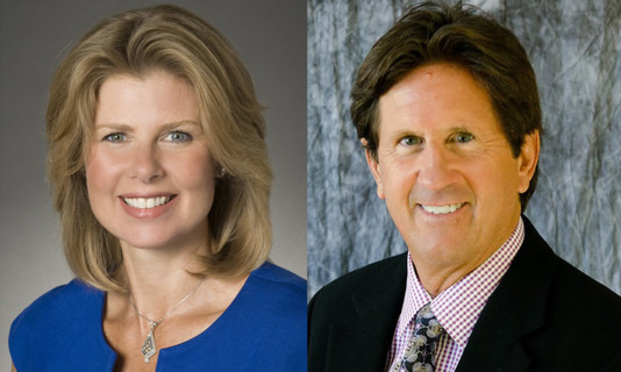Ex-Milberg Partner Claims Firm's Combination Deal a 'Fraudulent Scheme'
About a year after Milberg signed a deal to transfer assets, the firm's leader told ex-partner Steven Schulman it would no longer pay him.
January 04, 2019 at 02:27 PM
5 minute read
 Ariana Tadler, left, and Glenn Phillips, right.
Ariana Tadler, left, and Glenn Phillips, right.
A new $15 million lawsuit sheds more light on last year's name change of prominent class action law firm Milberg.
In a Manhattan Supreme Court lawsuit filed Wednesday, a convicted former partner alleges the deal—in which Milberg attorneys began to practice under the Milberg Tadler Phillips Grossman name—was part of a “fraudulent scheme” to evade Milberg's creditors, including the former partner.
Steven G. Schulman, a now-disbarred attorney and former equity partner of the legacy firm, said he is owed more than $15 million under a 2009 court judgment and has been getting monthly payments from the firm until August last year—about a year after the firms signed a deal to transfer assets.
The suit was filed against both the previous and current Milberg firms as well as managing partner Ariana Tadler and partners Glenn Phillips, Marc Grossman and Peggy Wedgworth.
In an email, Tadler said, “We are not going to comment on Mr. Schulman's accusations. We are focused on the future of our firm.”
Schulman was one of several former Milberg partners caught up in a kickback scheme that tarnished the history of one of the most powerful securities class action firms in the country. A federal grand jury in 2006 indicted Milberg Weiss Bershad & Schulman and Schulman for their role in paying millions of dollars in kickbacks to people who would serve as name plaintiffs in class actions and derivative lawsuits.
Schulman in October 2007 pleaded guilty to a racketeering conspiracy charge and agreed to forfeit $1.85 million and pay a fine of up to $250,000. Schulman, sentenced to six months in jail, was released in 2009. Ultimately three other former Milberg Weiss partners pleaded guilty to charges, including David Bershad, William Lerach and Melvyn Weiss.
Shortly after pleading guilty, Schulman brought an arbitration in 2007 against Milberg, arguing he was entitled to certain payments from the firm. In 2009, then Manhattan Supreme Court Justice Marylin Diamond confirmed an arbitration judgment directing Milberg to pay Schulman on a set schedule for certain categories, including for his withdrawal from the firm and from his capital account.
For instance, the judgment ordered Milberg to pay Schulman $3.1 million in January 2009, while Milberg was to pay Schulman monthly capital account payments from his $16.3 million capital account and monthly “base amount” payments.
Schulman's complaint said following the 2009 judgment until August 2018, he consistently received the monthly payments. Those amounts had to be capped, under the terms of the partnership agreement, and the amounts owed but not paid due to the cap were simply deferred to the next month, the complaint said.
In each successive month, with a few exceptions, the amount of each monthly payment increased, his complaint said, adding he was the firm's largest creditor.
Then, in September 2017, according to Schulman's court documents, Milberg and Milberg Tadler Phillips Grossman signed an agreement in which Milberg assigned substantially all of its assets to the other firm.
Those assets included all “active files,” Schulman's complaint said. When Milberg's successor firm was established—which the complaint dubs “Milberg II”—all of the prior firm's assets were transferred, but the firm “attempted to leave in Milberg, now an empty shell, debts owed to creditors,” Schulman alleges.
When Milberg announced the deal in January 2018, it heralded a “strategic combination” with Sanders Phillips Grossman, a national mass torts and personal injury firm, in which the firms would join forces under the moniker Milberg Tadler Phillips Grossman.
Operating Cash
Eight months later, in August 2018, Schulman said he stopped receiving monthly payments. Around this time, he said he received a letter in which Tadler, the managing partner, told him Milberg “will no longer make any further payments to you as a retired legacy partner because it does not have the operating cash or profits to continue to do so.”
But Schulman claims Milberg received tens of millions of dollars in legal fees from three cases in the last two years, including class actions against Merck & Co; Household International, a unit of HSBC; and Vivendi Universal S.A.
Instead of using those fees to capitalize the Milberg firm, its management committee distributed a substantial amount to current Milberg equity partners, the complaint alleges. “The distributions were part of a common plan and scheme by defendants to fraudulently avoid non-essential creditors, most particularly Schulman, its largest creditor, by stripping Milberg of its assets and continuing Milberg's law practice under Milberg II,” Schulman alleges.
Schulman said he recovered some amounts of the payments he was due for September, October and November 2018, after a sealed proceeding, but his Jan. 2 lawsuit is seeking a declaration that Milberg II is an alter ego or successor of Milberg and is thus responsible for Milberg's debts. Schulman is also asserting fraudulent conveyance claims against the firms and the partners.
Schulman's attorney, Eisner partner Leslie Corwin, said he's aware of other former Milberg partners who are also owed money, but he declined to discuss those details.
“They started a whole new firm and they're trying to carve out the creditors,” he said. “It's the ultimate Chutzpah.” Corwin described Schulman as a “key person in the firm being as successful as it was.”
This content has been archived. It is available through our partners, LexisNexis® and Bloomberg Law.
To view this content, please continue to their sites.
Not a Lexis Subscriber?
Subscribe Now
Not a Bloomberg Law Subscriber?
Subscribe Now
NOT FOR REPRINT
© 2025 ALM Global, LLC, All Rights Reserved. Request academic re-use from www.copyright.com. All other uses, submit a request to [email protected]. For more information visit Asset & Logo Licensing.
You Might Like
View All

Family Law Practitioners Weigh In on Court System's New Joint Divorce Program

Former NY City Hall Official Tied to Adams Corruption Probe to Plead Guilty

New Charges Expected in Sex Trafficking Case Against Broker Brothers
Trending Stories
- 1Parties’ Reservation of Rights Defeats Attempt to Enforce Settlement in Principle
- 2ACC CLO Survey Waves Warning Flags for Boards
- 3States Accuse Trump of Thwarting Court's Funding Restoration Order
- 4Microsoft Becomes Latest Tech Company to Face Claims of Stealing Marketing Commissions From Influencers
- 5Coral Gables Attorney Busted for Stalking Lawyer
Who Got The Work
J. Brugh Lower of Gibbons has entered an appearance for industrial equipment supplier Devco Corporation in a pending trademark infringement lawsuit. The suit, accusing the defendant of selling knock-off Graco products, was filed Dec. 18 in New Jersey District Court by Rivkin Radler on behalf of Graco Inc. and Graco Minnesota. The case, assigned to U.S. District Judge Zahid N. Quraishi, is 3:24-cv-11294, Graco Inc. et al v. Devco Corporation.
Who Got The Work
Rebecca Maller-Stein and Kent A. Yalowitz of Arnold & Porter Kaye Scholer have entered their appearances for Hanaco Venture Capital and its executives, Lior Prosor and David Frankel, in a pending securities lawsuit. The action, filed on Dec. 24 in New York Southern District Court by Zell, Aron & Co. on behalf of Goldeneye Advisors, accuses the defendants of negligently and fraudulently managing the plaintiff's $1 million investment. The case, assigned to U.S. District Judge Vernon S. Broderick, is 1:24-cv-09918, Goldeneye Advisors, LLC v. Hanaco Venture Capital, Ltd. et al.
Who Got The Work
Attorneys from A&O Shearman has stepped in as defense counsel for Toronto-Dominion Bank and other defendants in a pending securities class action. The suit, filed Dec. 11 in New York Southern District Court by Bleichmar Fonti & Auld, accuses the defendants of concealing the bank's 'pervasive' deficiencies in regards to its compliance with the Bank Secrecy Act and the quality of its anti-money laundering controls. The case, assigned to U.S. District Judge Arun Subramanian, is 1:24-cv-09445, Gonzalez v. The Toronto-Dominion Bank et al.
Who Got The Work
Crown Castle International, a Pennsylvania company providing shared communications infrastructure, has turned to Luke D. Wolf of Gordon Rees Scully Mansukhani to fend off a pending breach-of-contract lawsuit. The court action, filed Nov. 25 in Michigan Eastern District Court by Hooper Hathaway PC on behalf of The Town Residences LLC, accuses Crown Castle of failing to transfer approximately $30,000 in utility payments from T-Mobile in breach of a roof-top lease and assignment agreement. The case, assigned to U.S. District Judge Susan K. Declercq, is 2:24-cv-13131, The Town Residences LLC v. T-Mobile US, Inc. et al.
Who Got The Work
Wilfred P. Coronato and Daniel M. Schwartz of McCarter & English have stepped in as defense counsel to Electrolux Home Products Inc. in a pending product liability lawsuit. The court action, filed Nov. 26 in New York Eastern District Court by Poulos Lopiccolo PC and Nagel Rice LLP on behalf of David Stern, alleges that the defendant's refrigerators’ drawers and shelving repeatedly break and fall apart within months after purchase. The case, assigned to U.S. District Judge Joan M. Azrack, is 2:24-cv-08204, Stern v. Electrolux Home Products, Inc.
Featured Firms
Law Offices of Gary Martin Hays & Associates, P.C.
(470) 294-1674
Law Offices of Mark E. Salomone
(857) 444-6468
Smith & Hassler
(713) 739-1250






